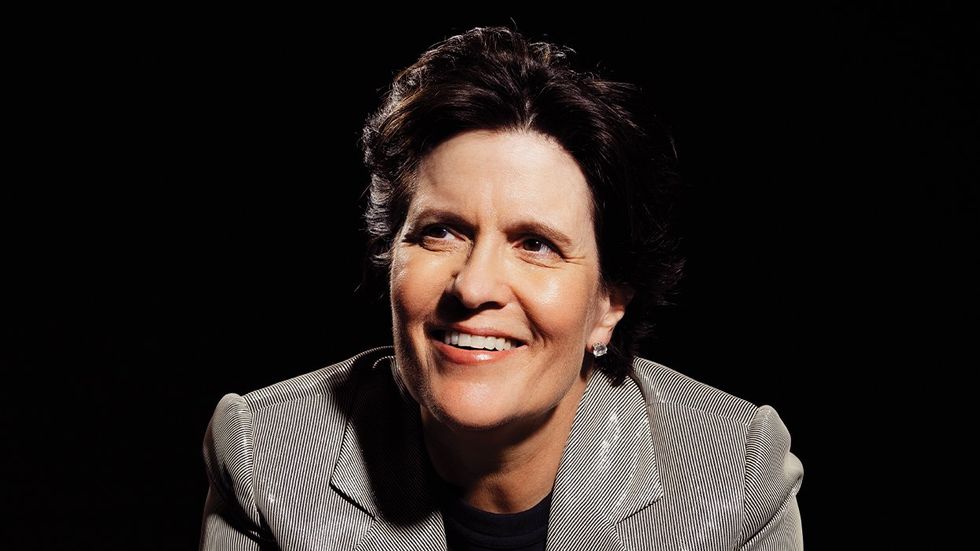Kara Swisher is a gay man.
Well, not really. She just doesn’t like all the things the lesbians are allegedly supposed to like, that’s if you listen to all the tropes. She loves a nice hotel (like me, she loves Aman), and she wears nice clothes. But really, she just laughs at the tropes anyway.
And that’s the Kara Swisher I spent time with: droll, thoughtful, frabjous, straightforward, and self-reflecting. Multitudes, indeed.
Always the reporter, the eternal, illuminating storyteller and the curious one in the room, I sense that Kara Swisher came into the world this way. Although my room was a Zoom call (from her home in Washington D.C., where she currently lives with her wife, Washington Post Opinion editor Amanda Katz), because you know, travel schedules of the busy bodies. It's probably also where she often records her twice-weekly podcast with Scott Galloway, Pivot, offering “sharp, unfiltered insights.” I tell everyone to listen to it, because it makes you smarter, and more of a critical thinker.
Swisher didn’t need a newsy item to be in the headlines, because she’s always there, submitting pauses where the tech world could benefit from it, and putting her hand up to add insights. And then writing, speaking, podcasting, conference-ing about it all, for decades now. But, in fact she does bring tidings this month, a new memoir/historical account called Burn Book, which you could say is a love story to, about, and for tech, sure.
And like love, it’s filled with the rollercoaster of our lives. It reads like a dishy recent history account — tech and political things you remember but have forgotten the details of perhaps. But added to all that is the ancillary insights, the vista-behind-the-annoyingly-tall-hedges way that Swisher shares freshness. And she should know, she’s been there since the beginning. Well, not of time, but certainly the beginning of what we know today to be “tech” since, say, the early 1990s.
Swisher moved out west around the same time, after working in D.C. at The Washington Post. In 1997 she joined The Wall Street Journal (working from their San Francisco bureau), creating a column called “Boom Town” about the companies, people, and culture making Silicon Valley. Tech hit San Francisco by storm, and Swisher was there for it. And for the trendy hardware stores, she still loves going to those.
She’s that swain of San Francisco (where she still has a home in the Castro), and it’s clear to me after speaking with her for just one moment, that that city loves her right back. “People say to me there is no place anymore, but I have traveled all over the world and I love most places, but that smell of wet eucalyptus in San Francisco and in general California, and something about that light, I just love — I see why people have always made their way out here.” That openness, that way of being an optimistic pessimist with the energy of possibility, that’s Swisher. And guess what, as much as I love New York, I do also feel this about California; she’s totally right. She still has that East Coast wit and sensibility — growing up in Princeton, N.J. — what can you expect?
 Philip Montgomery
Philip Montgomery
Speaking of her Castro home, it dates back to the late 19th century and she’s returned it to its former splendor. “They did terrible things to my house in the '70s,” she tells me. Swisher is, as she says “a frustrated architect who’s very untalented,” but does love to renovate houses. And so that the future residents will remember her, and know what really was going on in the world, she has left letters in the walls of all her homes. “They're in 10 different places in the Castro house, little notes from me, and pictures of my family. They cannot avoid Kara Swisher in a hundred years.”
In some ways, I see Swisher as the original; the tech writer who illuminated a path for the world to at least see things not only with the excitable rose-colored glasses. Of course, the fact that she’s gay thrills me. And adds to representation, that’s crucial in places often filled with straight white men. “There are a couple of gay people, Joanna Stern, from The Wall Street Journal tech of course, and (Apple CEO) Tim Cook, I don't know if you’ve heard of him, but he runs the world's most valuable company on the planet, and more.” So fine, she’s not the only queer in the tech world, but to me, she’s making pivotal flourishes.
Speaking of people changing the world — for better or worse, it depends on the day — I had to ask about my fellow countryman, Elon Musk. Swisher and Musk have had a friendly relationship since before Tesla days, she’d often have him on stage at her killer tech conferences (All Things Digital and later Recode, with those iconic red chairs) and more recently as Musk’s cult has grown and his red pill-ness has expanded, they are now estranged from each other — and there was that email where he called her an asshole. It sounds like a plot from “The Real Housewives of Techlandia.”
But Swisher actually no longer entertains Musk’s transphobia and bullying — especially after he retweeted an unfounded rumor that Nancy Pelosi’s husband was attacked in their home by his gay lover (of course that’s not what happened, it was a rightwing conspiracy theorist). This particular incident crossed some red line for Swisher.
Throughout history, people are always desperately seeking a visionary and it's just embedded in our human nature, I suppose. “When Steve Jobs died — who was an adult man, by the way, not clambering for affirmation — there was a void that opened, and Bezos was not that. So along comes Musk with the rocket ships and the cars, and that swashbuckle personality and people just loved it.” In fact, Swisher shares that from the conference stage one could watch these man crushes happening in front of your eyes — “men were giddy” as Musk spoke.
It was truly the boys with their toys.
“On the positive side it was inspirational, this guy telling people to take risks and do big things. And there were so many smart people doing small ideas from dating apps to laundry services — not curing cancer — but what Elon was doing was interesting and challenging and very manly. And he crafted that image carefully of Iron Man.”
Musk understood imagery, the way that Steve Jobs did, dressing a certain way and letting the world feed on this guise. “Jobs always dressed the part — Musk dresses strangely now actually — but I think in the beginning, all of this attention was good, and then it turned. Sort of like Trump, at first we thought he was funny but then it turned into lunacy.” And now, we cannot laugh at Trump because his need to be the dictator, and his influence on the world is actually petrifying.
Swisher, who studied propaganda in college (she has a BS in literature and journalism from Edmund A. Walsh School of Foreign Service at Georgetown University), has a very unique perspective on all of this. In fact, she focused on Accidentalism and the Holocaust specifically. And then at Columbia University (where she received a MS in journalism), one of her papers was specifically about how disinformation can radicalize society. “Like Trump says all the time, I am your warrior — but what’s most interesting for me, and I say this in the book, they pretend to be fighting against the man, to be of the people — but they are the man, these rich people are all the man”.
Swisher quotes Moana (which she says she has watched 400 times due to her little kids); “the island is in trouble unless you return the stolen heart.” And that is exactly what is dividing us. We cannot agree on the heart and its journey back, and who’s heart it actually is.
“I just did a really interesting interview with Judy Woodruff who has a really good series on PBS right now called 'America at a Crossroads' where she talks about these sociology experiments where kids are put into two groups and get to hang with each other, and then later they merge the groups and immediately they are at war with each other and later get into fist fights. And it’s because they love their teams and it’s somehow inherent in us to create teams and tribes.”
But civilization is supposed to elevate us to a place above throwing rocks at each other. And sometimes it's harmless like with sports or when RuPaul has a split Drag Race premiere and eventually the queens merge into one group. But, as Swisher says, social media has changed this: “Even if you have actual real doubts about it, you cannot betray your team. And so I think of someone like Trump or Musk, they speak with such certainty, even if you're wrong, and it furthers this chasm.”
And is this spoliation why the rich are all going to space, or building bunkers, or trying to hide away in New Zealand?
“Someone, I won’t tell you who, said to me, ‘Here is my escape plan, I’ve got a motorcycle and it will take me to Big Sur, where I have a place in the woods all ready to go” and [they] asked me what my plan would be, so I said, ‘Easy, I will find you, shoot you and take your motorcycle as you’ve now revealed everything to me’ — and I have two very large sons who can help execute this plan.” She sounds serious about it.
 Courtesy
Courtesy
When I ask her how she managed to do all the things she’s done, she references what she says in her book. That she just built a career saying “that doesn’t sound right to me” and letting herself dig further, fill in the rest of the picture. And she did this everywhere, for so many others. But as she details in the book, she wanted to “take back control” and own her content, so she created her own entire ecosystem. She spent years with the New York Times doing an Opinion column, offering prescience on tech. And now has another podcast called On with Kara Swisher from New York magazine. But it’s now all hers, she’s the keeper of all the content that we’re feeding on.
One of my favorite passages in Burn Book, and one we talk about on our call, is a biology course Swisher remembers from high school where her teacher said “everything's on its way to something else.” And that’s how she lives her life, not too sentimental, not too worried. Just allowing the natural flow of everything. More Zen-Buddha than I expected Kara Swisher to be.
In her book she mentions fairness and unfairness. So I ask her whether she thinks life is unfair? “In a way, I am used to things being unfair like my dad dying, which was just sad. But a lot of people get twisted around the axle like that's ‘unfair.’ I'm more accepting of unfairness. I assume it. And I think it curves me for more difficult times because I'm not surprised.” Currently, she’s putting her mother in a speciality facility for people when they get older, and she said, “I think of my dad every day, like today, my mother was being difficult as we were arranging things, my dad would have been lovely and cooperative. But I get why my mom would feel sick to her stomach, as you don’t have that much control over your life anymore. It’s old age and it’s the reality and it’s coming.”
In the book I also learn that Swisher has multiple tattoos. “Actually I do have one I hate, my first one, it’s on my right outside part of my ankle — luckily I can’t really see it. It’s a ginkgo leaf but everyone thinks it’s a shamrock — which is so insulting to me because why would I put a shamrock, how incredibly banal.” Swisher thinks a ginkgo leaf is beautiful; “they have been around since dinosaur times.”
We end up not talking about her kids much, because I have limited time with Kara Swisher and want to cover everything. I heard her children made her appreciate modern music, so I am all ears to hear more about them. “They're wonderful. I have the most cisgender-ed kids on the planet; they're so straight. Like when those people who hate gay people says ‘you're making gays,' I'm like ‘no you're making gays, we're making straight people.” And she laughs, that deep infectious kind of laugh.
When she’s not on a plane, or driving her beloved electric car, or going to the White House, she enjoys reading fiction. “You should read North Woods, by Daniel Mason, it’s a hell of a book — about these humans that lived in this house but when they pass [on], the house still goes on. It gives you that sense of eternity.”
Swisher is kind of like AI, which feels eternal and sort of potentially forever to me — like she will just learn more and more, and share more and more, and continue into the sunset. Ok, so Swisher might not be around forever, but the notes in her house will live on. And in the midst of all the construction and destruction of the world, we get a front-row seat right next to her. And it’s squishy and comfy, and she’s serving snacks and that drink I like. What more can we ask for?
This article is part of the Out March/April issue, which hits newsstands on April 2. Support queer media and subscribe — or download the issue through Amazon, Kindle, Nook, or Apple News starting March 18.




 Philip Montgomery
Philip Montgomery Courtesy
Courtesy













































































